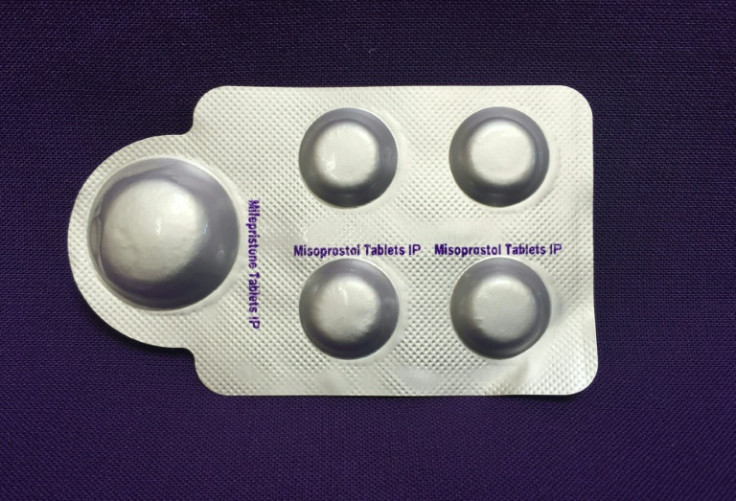Justice Dept Takes Abortion Pill Case To US Supreme Court; What Happens Next?
The U.S. Department of Justice on Thursday said it would ask the U.S. Supreme Court to intervene in a dispute over the abortion pill mifepristone after U.S. District Judge Matthew Kacsmaryk in Amarillo, Texas last Friday suspended approval of the drug, effectively banning it nationwide.
An appeals court put part of that decision on hold late Wednesday, preserving access to the pill for now, with significant restrictions the Justice Department will ask the Supreme Court to lift. Here is what you need to know about the case as it further unfolds:
WHAT IS MEDICATION ABORTION?
Medication abortion is a two-drug regimen consisting of mifepristone followed by misoprostol used to terminate a pregnancy within the first 10 weeks. It accounts for more than half of U.S. abortions.
WHAT HAS HAPPENED SO FAR?
Anti-abortion groups led by the Texas-based Alliance for Hippocratic Medicine sued the U.S. Food and Drug Administration last year, claiming the agency approved mifepristone for abortion in 2000 using an unlawful process and did not adequately consider the drug's safety.
After Kacsmaryk suspended the drug's approval, the Biden administration asked the 5th U.S. Circuit Court of Appeals for an emergency stay putting his order on hold.
That court blocked Kacsmaryk's suspension of the drug's original approval, but not parts of his order that effectively reinstate restrictions on the drug that the FDA has lifted since 2016. Those include a requirement for multiple doctors visits, that it be dispensed in person, rather than by mail, and a limit on its use to the first seven weeks of pregnancy, down from 10.
Neither Kacsmaryk's order, known as a preliminary injunction, nor the 5th Circuit's emergency stay is a final ruling on the merits of the case. Both are meant to remain in place until the case can be more fully heard.
WHAT ABOUT THE RULING FROM WASHINGTON STATE?
Minutes after Kacsmaryk's order, U.S. District Judge Thomas Rice in Spokane, Washington ordered the FDA not to make any changes to mifepristone access. That ruling applies only in 17 Democratic-led states and the District of Columbia, which had argued the government should loosen special safety restrictions around the pill.
Legal experts say that the ruling creates a conflict withKacsmaryk's, which will need to be resolved. The administration has asked Rice to clarify how his order is affected by Kacsmaryk's.
WHAT WILL THE BIDEN ADMINISTRATION DO FIRST?
The Biden administration said on Thursday it will appeal to the Supreme Court for an emergency stay of Kacsmaryk's order in full. Emergency petitions from the 5th Circuit initially go to Justice Samuel Alito, one of the court's most conservative justices and the author of last year's ruling overturning Roe v. Wade, which had guaranteed abortion rights nationwide.
Individual justices typically refer emergency petitions to the full court, though they can also decide them on their own. Such petitions are usually decided without argument and with minimal explanation; for that reason, they are often known collectively as the court's "shadow docket."
WHAT DOES A STAY MEAN FOR MIFEPRISTONE?
If the FDA wins a stay from the Supreme Court blocking the injunction, mifepristone will remain available with no new restrictions. If it does not, the new restrictions will take effect at 12 a.m. CDT (0500 GMT) on Saturday. Legal experts have said, however, that the FDA has discretion over what it will enforce, potentially allowing it to preserve less restricted access to the drug at least while the case is proceeding.
WILL A STAY END THE APPEAL?
No. Regardless of whether it wins an emergency stay, the FDA will pursue a full appeal of Kacsmaryk's preliminary injunction. The agency and the anti-abortion groups will both have a chance to file briefs with their legal arguments in the 5th Circuit. The panel that hears the case may be different from the one that partly denied the stay.
The 5th Circuit will not be considering the full merits of the case, but only whether Kacsmaryk was right to issue a preliminary injunction. That depends on whether the plaintiffs challenging mifepristone's approval have shown a likelihood that they will win on the merits, and that they would be irreparably harmed without an injunction.
That appeal process could last months. Whichever way the panel rules, the losing party could petition for rehearing with all judges of the 5th Circuit, known as en banc rehearing, and ultimately petition the Supreme Court.
WHAT NEXT?
Once all the appeals over the preliminary injunction are over, the case can proceed to trial on the merits, giving both sides a chance to present factual evidence.
The FDA will need to produce evidence about the process leading to mifepristone's original approval in 2000, as well as for the changes it made in 2016 and later.
The anti-abortion groups will have to offer evidence to support their claim that the process was improper, and that mifepristone is dangerous. The two sides will exchange evidence in a process known as discovery.
Kacsmaryk could then decide the case without trial, known as summary judgment, or hold a trial including witness testimony.
A final resolution could be months or years away. Once it does come, the losing side will again have the chance to appeal to the 5th Circuit and, eventually, the Supreme Court.

© Copyright Thomson Reuters {{Year}}. All rights reserved.





















